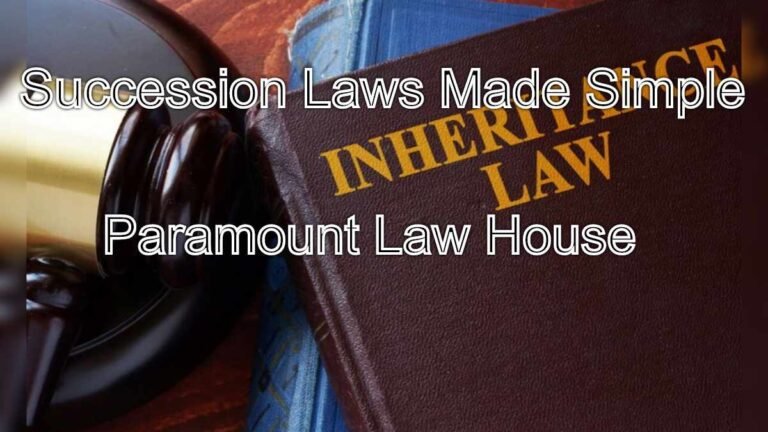Hire Purchase Agreements: Ensure Legal Compliance
Hire Purchase Agreements: Hire purchase agreements represent a common financing method. They allow individuals or businesses to acquire assets. These assets can…
Hire Purchase Agreements: Hire purchase agreements represent a common financing method. They allow individuals or businesses to acquire assets. These assets can range from vehicles to machinery. However, these agreements involve intricate legalities. They demand strict compliance. Missteps can lead to significant financial and legal repercussions. Paramount Law House: Property Lawyers 24×7 offers expert legal guidance. We ensure full adherence to all relevant laws. We help clients navigate these complex contracts seamlessly.
Hire Purchase Agreements: Ensure Legal Compliance: Paramount Law House
Understanding Hire Purchase Agreements
A hire purchase (HP) agreement is a contract. It allows a hirer to possess and use goods. They do this by making regular payments to the owner. Ownership of the goods transfers only after the final installment is paid. Until then, the owner retains title to the goods. This distinguishes it from an outright sale or a simple loan.
The agreement fundamentally involves two parties: the owner (often a finance company or dealer) and the hirer (the person or entity acquiring the goods). The Hire Purchase Act, 1972, previously governed these transactions in India. However, this Act was repealed in 2017. Currently, the legal framework primarily relies on the Indian Contract Act, 1872, and the Sale of Goods Act, 1930. Other relevant statutes include the Companies Act, 2013 (if parties are companies) and the Consumer Protection Act, 2019. Understanding this evolving legal landscape is paramount.
Key Elements of a Valid Hire Purchase Agreement
For an HP agreement to be legally enforceable, it must contain certain essential elements:
- Offer and Acceptance: There must be a clear offer by one party and an unequivocal acceptance by the other.
- Consideration: Both parties must provide something of value. This includes the goods for the hirer and the payments for the owner.
- Competent Parties: Both the owner and hirer must be legally competent to contract. This means they must be of legal age and sound mind.
- Free Consent: Consent to the agreement must be given freely. It should not be influenced by coercion, undue influence, fraud, misrepresentation, or mistake.
- Lawful Object and Consideration: The purpose and terms of the agreement must be lawful. They should not violate any public policy.
- Certainty of Terms: All terms and conditions must be clear and unambiguous. This includes payment schedules, interest rates, and details of the goods.
Furthermore, the agreement must specify:
- The description of the goods.
- The cash price of the goods.
- The hire-purchase price.
- The date of commencement of the agreement.
- The number of installments, amount of each installment, and the due date.
- The amount of the down payment (if any).
- The rights and liabilities of both the owner and the hirer.
Failure to include these details can render the agreement void or unenforceable.
Rights and Liabilities of the Hirer
The hirer possesses specific rights and incurs certain liabilities under an HP agreement:
Hirer’s Rights:
- Right to terminate the agreement: The hirer generally has the right to terminate the agreement at any time. This is done by returning the goods and paying any outstanding installments and agreed charges.
- Right to complete purchase: The hirer can complete the purchase at any time. They pay the balance outstanding, possibly with a rebate on interest.
- Right to assign: The hirer can assign their rights under the HP agreement to a third party. This requires the owner’s consent.
- Right to quiet possession: The hirer has the right to use the goods without interference from the owner, as long as payments are being made.
- Right to receive statements: The hirer can request a statement of account. This shows payments made and the balance outstanding.
Hirer’s Liabilities:
- Duty to pay installments: The primary liability is to make timely payments as per the schedule.
- Duty to take reasonable care of goods: The hirer must take proper care of the goods. They should not damage them beyond normal wear and tear.
- Duty to inform owner of change of address: The hirer must inform the owner if they change their address. This ensures proper communication.
- Duty to return goods on termination/default: If the agreement is terminated or defaulted upon, the hirer must return the goods to the owner.
Breach of these liabilities can lead to repossession by the owner.
Rights and Liabilities of the Owner
The owner also has specific rights and liabilities:
Owner’s Rights:
- Right to receive payments: The owner has the right to receive timely installments from the hirer.
- Right to terminate the agreement: The owner can terminate the agreement in specific circumstances. These include default in payment or breach of other terms by the hirer.
- Right to repossess goods: Upon termination due to default, the owner has the right to repossess the goods. This right is critical for the owner’s security. However, repossession must be conducted legally and peacefully.
- Right to claim damages: The owner can claim damages for any breach of contract by the hirer.
- Right to inspect goods: The owner can inspect the goods periodically. This ensures they are being properly maintained.
Owner’s Liabilities:
- Duty to disclose essential information: The owner must clearly disclose all terms. This includes the cash price, HP price, and payment schedule.
- Duty to ensure goods are of merchantable quality: The owner must ensure the goods are fit for their ordinary purpose. They must also be of satisfactory quality.
- Duty to ensure good title: The owner must have good title to the goods at the time of purchase option exercise by the hirer.
- Duty to not interfere with hirer’s quiet possession: The owner cannot interfere with the hirer’s use of the goods as long as the agreement is active and terms are met.
Properly delineating these rights and liabilities in the agreement prevents future disputes.
Repossession of Goods: Legal Safeguards
Repossession is a contentious area. The owner’s right to repossess is crucial. However, it is not absolute. The process must adhere to legal norms. Unlawful repossession can lead to legal action against the owner.
- Notice of Default: Typically, the owner must issue a notice of default to the hirer. This notice specifies the breach and provides an opportunity to remedy it.
- Peaceful Repossession: Repossession must be conducted peacefully. The use of force or intimidation is illegal. Owners often engage third-party recovery agents. They must ensure these agents operate within legal boundaries.
- Court Intervention: If the hirer resists repossession, the owner may need to seek a court order. This is typically a specific performance or recovery of possession suit.
- Accountability for Sale Proceeds: If the repossessed goods are sold, the owner must account for the sale proceeds. Any surplus after deducting outstanding amounts and expenses must be returned to the hirer. Conversely, the hirer may remain liable for any shortfall.
Paramount Law House advises both owners and hirers on repossession matters. We ensure adherence to legal procedures. This protects our clients’ interests.
Stamp Duty and Registration
Hire purchase agreements are subject to stamp duty under the Indian Stamp Act, 1899, and state-specific stamp duty acts. The amount of stamp duty varies by state and depends on the value of the goods. Proper stamping makes the document admissible as evidence in court. While generally not mandatorily registrable under the Registration Act, 1908, for movable property, companies often register charges created by HP agreements with the Registrar of Companies (RoC) under the Companies Act, 2013. This provides public notice of the charge. It protects the owner’s interest against third parties.
Consumer Protection Act, 2019
The Consumer Protection Act, 2019, offers significant protection to hirers who qualify as “consumers.” If a hirer faces unfair trade practices, defective goods, or deficiency in service from the owner or dealer, they can approach the Consumer Forum. This provides an additional layer of redressal. This Act has broad implications for all commercial transactions involving consumers.
Dispute Resolution Mechanisms
Disputes invariably arise in commercial contracts. HP agreements are no exception. Parties can opt for various dispute resolution mechanisms:
- Negotiation: Direct discussions between parties can often resolve minor disagreements.
- Mediation: A neutral third party facilitates discussions. They help parties reach a mutually agreeable solution.
- Arbitration: Parties agree to submit their dispute to an arbitrator. The arbitrator’s decision (award) is legally binding. Arbitration offers a quicker and often less formal alternative to court.
- Litigation: If other methods fail, parties may pursue legal action in civil courts. This can involve suits for recovery of money, specific performance, or declaration of rights.
Paramount Law House provides robust representation in all dispute resolution forums. We strive for efficient and favorable outcomes for our clients.
The Role of Legal Expertise
Navigating the complexities of hire purchase agreements demands specialized legal expertise. The repealed Hire Purchase Act, 1972, has left a void. This makes reliance on general contract law principles and judicial precedents more critical.
Paramount Law House: Property Lawyers 24×7 offers comprehensive legal support:
- Drafting and Review: We meticulously draft and review HP agreements. We ensure they are legally sound. We also ensure they protect our clients’ interests. All necessary clauses are included.
- Compliance Audit: We conduct audits of existing agreements. We identify areas of non-compliance. We then provide recommendations for rectification.
- Advisory Services: We offer ongoing legal advice on all aspects of HP agreements. This includes questions on rights, liabilities, and termination.
- Dispute Resolution: We represent clients in negotiations, mediation, arbitration, and litigation. We protect their rights in repossession matters or disputes over payments.
- Training: We provide training to financial institutions and dealers. This educates them on the legal intricacies of HP agreements.
Our deep understanding of property law and contract law positions us uniquely. We handle all facets of hire purchase transactions.
Frequently Asked Questions
A1: While the Hire Purchase Act, 1972, was repealed, the primary legal framework governing hire purchase agreements in India today relies mainly on the Indian Contract Act, 1872, and the Sale of Goods Act, 1930.
A2: For a hire purchase agreement to be legally valid, it must include elements such as a clear offer and acceptance, adequate consideration from both parties, legally competent parties, free consent, and a lawful object and consideration.
A3: The hirer possesses several key rights, including the right to terminate the agreement by returning the goods and settling dues, the right to complete the purchase by paying the outstanding balance, the right to assign their rights with the owner’s consent, and the right to quiet possession of the goods as long as payments are made.
A4: When repossessing goods, the owner must adhere to strict legal considerations. This typically involves issuing a notice of default to the hirer. Repossession must always be conducted peacefully, without the use of force. If resistance occurs, the owner may need to seek a court order.
A5: The Consumer Protection Act, 2019, significantly impacts hire purchase agreements by offering robust protection to hirers who qualify as “consumers.” If a consumer faces issues like unfair trade practices, defective goods, or deficiency in service from the owner or dealer, they can approach the Consumer Forum for redressal.
Conclusion
Hire purchase agreements are vital financial instruments. They facilitate access to valuable assets. However, their legal compliance is paramount. Ignorance of legal requirements or failure to adhere to procedures can lead to severe financial penalties and legal battles. Paramount Law House: Property Lawyers 24×7 is your trusted legal partner. We ensure that your hire purchase transactions are fully compliant. We safeguard your interests at every stage. Rely on our expertise to navigate these agreements with confidence. Ensure that your operations are legally sound and efficient.
Read More
- House Owner Tenant Issue Resolution: Legal Support Available
- Housing Development Law Experts: Navigate Legal Frameworks
- Illegal Possession of Immovable Property: Legal Remedies Available
- Indian Easements: Legal Guidance for Property Owners
- Industrial Land Law Experts: Ensure Compliance and Protection
- Ministry of Law and Justice, Government of India:






